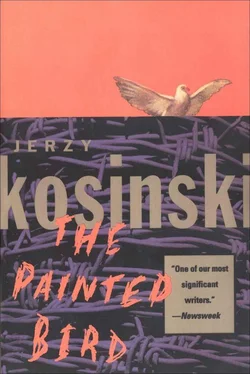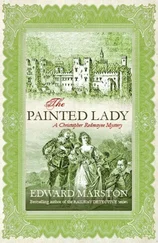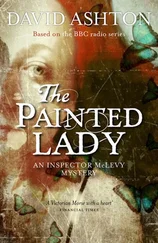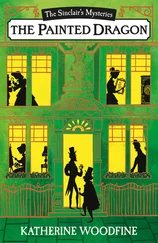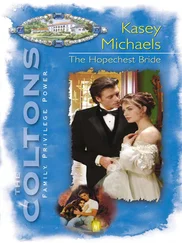Jerzy Kosiński - The Painted Bird
Здесь есть возможность читать онлайн «Jerzy Kosiński - The Painted Bird» весь текст электронной книги совершенно бесплатно (целиком полную версию без сокращений). В некоторых случаях можно слушать аудио, скачать через торрент в формате fb2 и присутствует краткое содержание. Год выпуска: 1965, ISBN: 1965, Жанр: Детская проза, на английском языке. Описание произведения, (предисловие) а так же отзывы посетителей доступны на портале библиотеки ЛибКат.
- Название:The Painted Bird
- Автор:
- Жанр:
- Год:1965
- ISBN:978-0-8021-9575-3
- Рейтинг книги:4 / 5. Голосов: 1
-
Избранное:Добавить в избранное
- Отзывы:
-
Ваша оценка:
- 80
- 1
- 2
- 3
- 4
- 5
The Painted Bird: краткое содержание, описание и аннотация
Предлагаем к чтению аннотацию, описание, краткое содержание или предисловие (зависит от того, что написал сам автор книги «The Painted Bird»). Если вы не нашли необходимую информацию о книге — напишите в комментариях, мы постараемся отыскать её.
The Painted Bird — читать онлайн бесплатно полную книгу (весь текст) целиком
Ниже представлен текст книги, разбитый по страницам. Система сохранения места последней прочитанной страницы, позволяет с удобством читать онлайн бесплатно книгу «The Painted Bird», без необходимости каждый раз заново искать на чём Вы остановились. Поставьте закладку, и сможете в любой момент перейти на страницу, на которой закончили чтение.
Интервал:
Закладка:
To be capable of deciding the fate of many people whom one did not even know was a magnificent sensation. I was not sure whether the pleasure depended only on the knowledge of the power one had, or on its use.
A few weeks later the Silent One and I went to a local marketplace where peasants from the neighboring villages brought their produce and home crafts once a week. We usually managed to snare an apple or two, a bunch of carrots, or even a glass of cream in return for the smiles we lavished on the buxom peasant women.
The market was swarming with people. Farmers loudly hawked their goods, women tried on colorful skirts and blouses, scared heifers mooed, and pigs ran squealing underfoot.
Staring at the gleaming bicycle of a militiaman I stumbled against a tall table with dairy produce on it, knocking it over. Buckets of milk and cream and jugs of buttermilk spilled everywhere. Before I had time to run away a tall farmer, purple with rage, hit me hard in the face with his fist. I fell down, spitting out three teeth together with blood. The man lifted me by the scruff of my neck like a rabbit and went on beating me until the blood spattered over his shirt. Then he pushed aside the gathering crowd of onlookers and jammed me into an empty sauerkraut barrel and kicked it over into a garbage heap.
For a moment I did not know what had happened. I heard the laughter of the peasants; my head was spinning from the beating and the rolling in the barrel. I was choking with blood; I felt my face swelling.
Suddenly I saw the Silent One. Pale and shaking he was trying to get me out of the barrel. The peasants, calling me a Gypsy stray, laughed at his efforts. Afraid of further attacks, he started rolling the barrel with me inside toward a water fountain. Some village boys ran along, trying to trip him and take it away. He warded them off with a club until we finally reached the fountain.
Soaked with water and blood, with splinters sticking in my back and hands, I crawled out of the barrel. The Silent One supported me on his shoulder as I staggered along. We reached the orphanage after a painful walk.
A doctor dressed my cut mouth and cheek. The Silent One waited outside the door. When the doctor left, he contemplated my lacerated face for a long time.
Two weeks later the Silent One woke me at dawn. He was covered with dust and his shirt clung to his perspiring body. I gathered that he must have been out all night. He signaled me to follow him. I dressed quickly and we were soon outside with no one the wiser.
He took me to a derelict hut not far from the railroad crossing where we had oiled the points. We scrambled onto the roof. The Silent One lit a cigarette which he had found on the way and gestured for me to wait. I did not know what it was all about, but I had nothing else to do.
The sun was just beginning to rise. Dew was evaporating from the tar-paper roof and brown worms started to crawl out from under the rain gutters.
We heard the whistle of a train. The Silent One stiffened and pointed with his hand. I watched the train appear in the faraway haze and slowly come nearer. It was market day and many of the peasants took this first morning train which ran through some of the villages before dawn. The carriages were filled. Baskets stuck out of the windows and people hung on to the steps in bunches.
The Silent One drew closer to me. He was sweating and his hands were moist. He licked his drawn lips from time to time. He brushed back his hair. He stared at the train and suddenly he seemed much older.
The train was approaching the crossing. The cramped peasants leaned out of the windows, their blond hair flying in the wind. The Silent One squeezed my arm so hard that I jumped. At the same moment the train’s locomotive veered aside, twisting violently as if pulled by some invisible force.
Only the two front cars followed the engine obediently. The others hobbled and then like frisky horses started climbing on one another’s backs, falling off the embankment at the same time. The crash came with a tumultuous crunch and screech. A cloud of steam shot up into the sky obscuring everything. Screams and cries came from below.
I was stunned and quivered like a telephone wire struck by a stone. The Silent One sagged. He gripped his knees spasmodically for a while, looking at the dust settling slowly. Then he turned and dashed for the stairs, pulling me along behind him. We quickly returned to the orphanage, avoiding the crowd of people rushing to the scene of the accident. Ambulance bells were clanging in the vicinity.
At the orphanage everyone was still asleep. Before going into the dormitory I took a good look at the Silent One. There was no trace of tension in his face. He looked back at me, smiling softly. If it had not been for the bandage over my face and mouth I would have smiled too.
During the next few days everyone at school talked about the railroad disaster. Black-bordered newspapers listed the names of the casualties; the police were looking for political saboteurs suspected of previous crimes. Over the track cranes were lifting the carriages, which were entangled with one another and twisted out of shape.
On the next market day the Silent One hurried me to the marketplace. We pushed through the crowd. Many of the stands were empty and cards with black crosses informed the public of the deaths of their owners. The Silent One looked at them and signified his pleasure to me. We were heading for the stand of my tormentor.
I looked up. The familiar shape of the stand was there, with its jugs of milk and cream, bricks of butter wrapped in cloth, some fruit. From behind them, as in a puppet show, popped up the head of the man who had knocked out my teeth and pushed me into a barrel.
I looked at the Silent One in anguish. He was staring at the man in disbelief. When he caught my glance he grabbed my hand and we quickly left the market. As soon as we reached the road, he fell down on the grass and cried as though in terrible pain, his words muffled by the ground. It was the only time that I had heard his voice.
19
Early in the morning one of the teachers called me out. I was being summoned to the office of the principal. At first I thought it must be news from Gavrila, but on the way I began to have my doubts.
The principal was waiting for me in her office, accompanied by the member of the Social Commission who thought he had known my parents before the war. They greeted me cordially and asked me to sit down. I noticed that they were both rather nervous, though they tried to conceal it. I looked anxiously around, and heard voices in an adjoining office.
The man from the Commission went into the other room and talked to someone in there. Then he opened the door wide. A man and a woman stood inside.
They seemed somehow familiar, and I could hear my heart beating under the star of my uniform. Forcing an expression of indifference, I scrutinized their faces. The resemblance was striking; these two could be my parents. I clutched my chair while thoughts raced through my mind like ricocheting bullets. My parents . . . I didn’t know what to do; admit that I recognized them or pretend that I didn’t?
They came closer. The woman bent over me. Her face was suddenly creased by tears. The man, nervously adjusting the spectacles on his moist nose, supported her on his arm. He also was shaking with sobs. But he quickly overcame them and addressed me. He spoke to me in Russian and I noted that his speech was as fluent and beautiful as Gavrila’s. He asked me to unbutton my uniform: on my chest, on the left side, there should be a birthmark.
I knew I had the birthmark. I hesitated, wondering whether to expose it. If I did, everything would be lost; there would be no doubt that I was their son. I pondered for a few minutes, but I felt sorry for the crying woman. I slowly unbuttoned my uniform.
Читать дальшеИнтервал:
Закладка:
Похожие книги на «The Painted Bird»
Представляем Вашему вниманию похожие книги на «The Painted Bird» списком для выбора. Мы отобрали схожую по названию и смыслу литературу в надежде предоставить читателям больше вариантов отыскать новые, интересные, ещё непрочитанные произведения.
Обсуждение, отзывы о книге «The Painted Bird» и просто собственные мнения читателей. Оставьте ваши комментарии, напишите, что Вы думаете о произведении, его смысле или главных героях. Укажите что конкретно понравилось, а что нет, и почему Вы так считаете.
